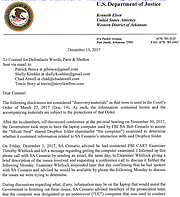FAYETTEVILLE -- A letter detailing the wiping of computer records in a public corruption case involving state legislators should never have been posted on a public website of court records, a federal judge declared in an order Tuesday. A hearing was set for Jan. 25 to consider disciplinary action against Gregory F. Payne of the Story Law Firm in Fayetteville, the defense attorney named in the court order.
The kickback case is against former Sen. Jon Woods of Springdale, consultant Randell Shelton Jr. and Oren Paris III, president of Ecclesia College. Woods is accused of taking kickbacks from Paris in return for arranging state General Improvement Fund grants for the private Christian college. Kickbacks were paid through consulting fees that went to Shelton, according to the government's case. Former state Rep. Micah Neal of Springdale pleaded guilty Jan. 4 to his role in the scheme.
Neal covertly recorded telephone conversations, some of which are set to be used in the government's case. Another 79 recordings were discovered after Shelton's defense counsel discovered gaps in the narrative, according to court records. The government learned the laptop used in the investigation had its memory wiped after unauthorized personal use by a FBI agent. Those details were in a three-page letter attached to a defense motion to dismiss from an attorney for Paris that was posted late Monday and removed from the court's website early Tuesday, but not before the Northwest Arkansas Democrat-Gazette reported the contents.
U.S. District Judge Timothy L. Brooks ordered Payne to appear Jan. 25 to "show cause why this court should not find that he willfully violated the court's protective order and should not take disciplinary action against him, to include monetary sanctions, disbarment from the bar of this court, and reporting any sanctions imposed on him in this matter to any other courts of whose bar he may be a member."
A request for comment from Payne or the law firm wasn't returned Tuesday.
All matters of discovery in this case are under a court-ordered seal, something the letter in question states, Brooks said in his order Tuesday. "The opening sentences of the very letter at issue stated in unmistakable language that the following disclosures are considered discovery materials," the court order said.
Payne and other defense counsel in previous motions have protested the secrecy surrounding the case, expressing frustration and calling the protective order sealing records an infringement of their clients' rights. Brooks overruled those objections.
The case trial is set for April 9.
"Mr. Payne may disagree with this court's ruling on that motion," the Tuesday order states. "But the court's ruling was clear, and he had notice of it. Disagreement with a court order is not a license for an officer of the court to disobey it."
"Finally, the timing of Mr. Payne's actions is especially troubling to the court," Tuesday's order states. "He caused these materials to be filed publicly at 6:04 p.m. on Dec. 18, more than an hour after the court had closed for the day. By 4:30 a.m. the following morning -- several hours before the court would be open again for business -- a lengthy article had already been published in an prominent Arkansas newspaper containing extensive discussion of these materials."
These circumstances make it appear the timing was deliberately intended to make sure the court couldn't either stop the posting or remedy the situation, the order says.
NW News on 12/20/2017


